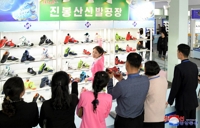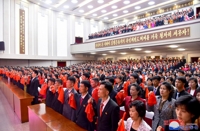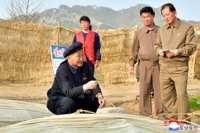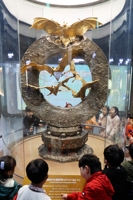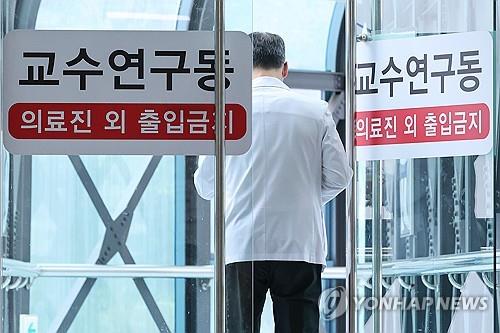U.S. lawmakers express concerns over S. Korea's anti-Pyongyang leafleting ban
By Byun Duk-kun
WASHINGTON, April 15 (Yonhap) -- A group of U.S. lawmakers on Thursday expressed concerns over a recent South Korean law that prohibits the dispersal of propaganda leaflets to North Korea, noting the law may limit the freedom of speech of South Koreans and others working to promote human rights.
Their shared concerns were expressed at the start of a hearing hosted by a bipartisan caucus of the House of Representatives, the Tom Lantos Human Rights Commission.
The leaflets were typically flown over the border by balloon.
"Some have claimed the content of these balloons are being unnecessarily provocative as justification for outlawing their use. However, can we, in good conscience, really pay the cost of curbing free speech liberties for the sake of a regime that has no intention of offering reciprocal concessions?" Rep. Young Kim (R-CA) said in the hearing, joined by six witnesses that included a well-known North Korean human rights activist, Suzanne Scholte.
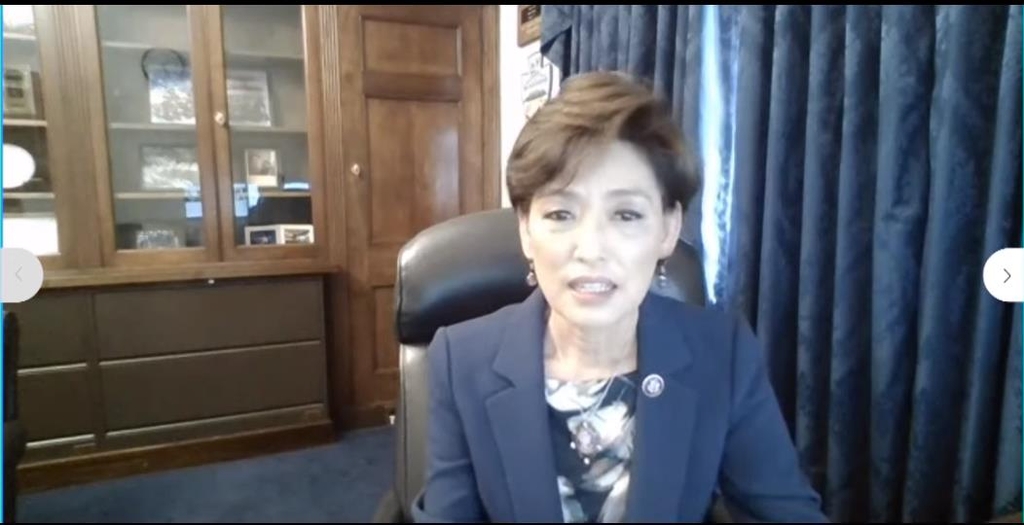
The captured image from a Youtube channel of the Tom Lantos Human Rights Commission shows Rep. Young Kim (R-CA) speaking in a virtual commission hearing in Washington on April 15, 2021 on South Korea's recently legislated ban on anti-North Korea leaflets. (Yonhap)
The commission, formerly the Congressional Human Rights Caucus, is a bipartisan body, formed in 1983, with a mission to "promote, defend and advocate internationally recognized human rights norms as enshrined in the Universal Declaration of Human Rights." Lantos, a longtime California congressman who died in 2008, was chairman of the House Foreign Affairs Committee.
The South Korean National Assembly passed a law in December prohibiting the dispersal of propaganda leaflets to North Korea.
Rep. James McGovern (D-MA) said he hopes the South Korean parliament would amend the law.
"Personally, I hope the assembly decides to fix the bill. Again, that's the advantage of living in a democracy. There's always a chance for a redo," he said.
McGovern noted those who support the law justify it "on security grounds" that the sending of anti-Pyongyang leaflets had long exposed South Korean residents near the inter-Korean border to physical harm.
"But the law has been widely criticized inside and outside of South Korea for suppressing speech because it appears to cover third countries, and for using vague and overly broad language," said the lawmaker.
McGovern also drew a clear line between support for free speech and what he called grievances toward South Korean President Moon Jae-in's policy of engagement with North Korea.
"To the extent that the testimony we are about to hear amounts to a political broadside against the Moon government, let me be very clear. Such assertions do not meet the standards to be considered human rights arguments, and I strongly disassociate myself from them," he said.
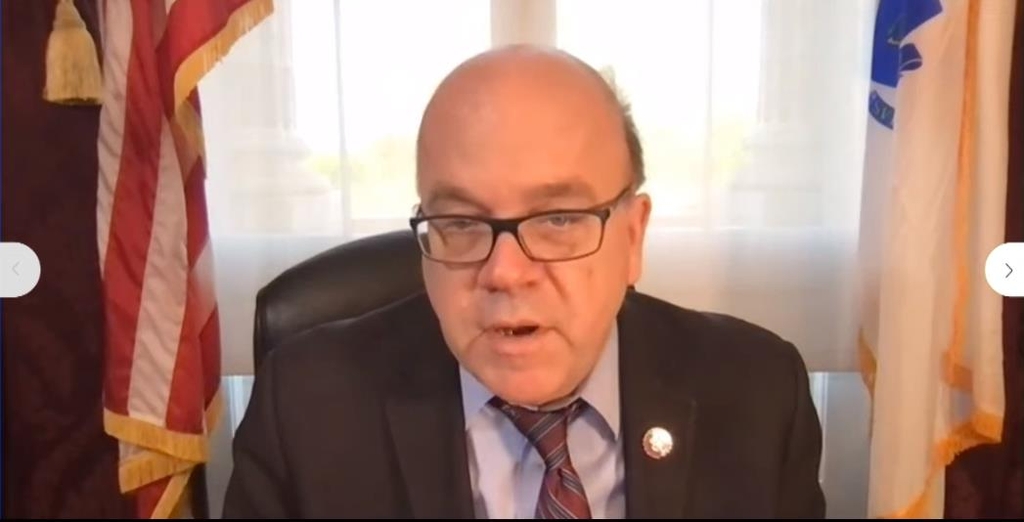
The captured image from a Youtube channel of the Tom Lantos Human Rights Commission shows Rep. James McGovern (D-MA) speaking in a virtual commission hearing in Washington on April 15, 2021, on South Korea's recently legislated ban on anti-North Korea leaflets. (Yonhap)
Rep. Christopher Smith (R-NJ) said he was alarmed by the anti-leafleting law, which he said has been referred to by others as "South Korea's democratic decay."
He noted the U.S. too may have problems of its own when it comes to civil rights, but insisted the U.S. and its Congress have an obligation to speak out.
"True friends point out flaws in friends' human rights records precisely out of friendship. And this principle is a reciprocal one," said Smith.
"It must also be said that the Republic of Korea is a democracy and and its commitment to fundamental human rights stands in stark contrast to the Kim family's brutal dictatorship to the north in the Democratic People's Republic of Korea," he added, referring to North Korea by its official name and to leader Kim Jong-un.
bdk@yna.co.kr
(END)
-
 Ateez member Yunho throws first pitch at MLB match between Dodgers, Mets
Ateez member Yunho throws first pitch at MLB match between Dodgers, Mets -
 Gov't likely to accept university chiefs' request to lower med school enrollment quota
Gov't likely to accept university chiefs' request to lower med school enrollment quota -
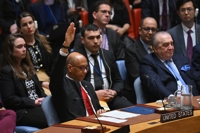 S. Korea supports resolution backing U.N. membership of Palestine
S. Korea supports resolution backing U.N. membership of Palestine -
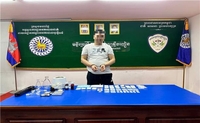 Chinese man behind drug scam targeting teens nabbed in Cambodia
Chinese man behind drug scam targeting teens nabbed in Cambodia -
 S. Korea, U.S. to hold 1st round of defense cost sharing talks this week
S. Korea, U.S. to hold 1st round of defense cost sharing talks this week
-
 Gov't likely to accept university chiefs' request to lower med school enrollment quota
Gov't likely to accept university chiefs' request to lower med school enrollment quota -
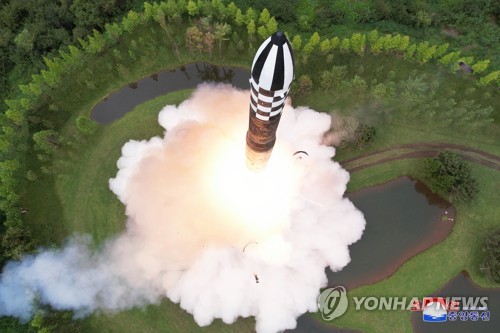 Experts see possibility of N.K. conducting nuclear test before U.S. presidential vote
Experts see possibility of N.K. conducting nuclear test before U.S. presidential vote -
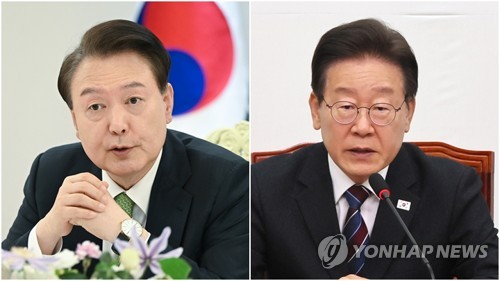 Details of meeting between Yoon, opposition leader undecided: presidential office
Details of meeting between Yoon, opposition leader undecided: presidential office -
 Looming weekly closure of major hospitals feared to worsen medical service crisis
Looming weekly closure of major hospitals feared to worsen medical service crisis -
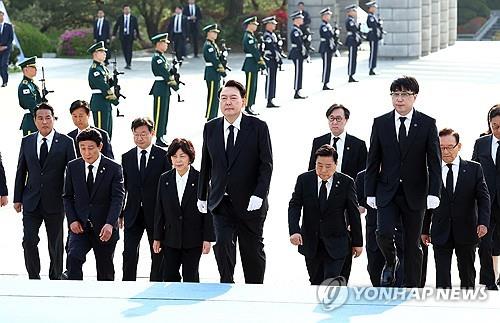 Yoon's approval rating sinks to lowest point since taking office
Yoon's approval rating sinks to lowest point since taking office
-
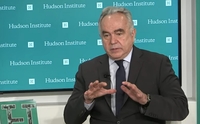 U.S. will take steps for three-way engagement on nuclear deterrence with S. Korea, Japan: Campbell
U.S. will take steps for three-way engagement on nuclear deterrence with S. Korea, Japan: Campbell -
 (LEAD) Hybe to file complaint against sublabel executives over internal conflict
(LEAD) Hybe to file complaint against sublabel executives over internal conflict -
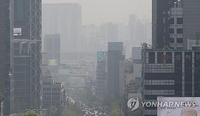 S. Korea reports highest suicide rate, ultra fine dust level among OECD nations: data
S. Korea reports highest suicide rate, ultra fine dust level among OECD nations: data -
 U.S. sent ATACMS missiles to Ukraine following Russia's use of N.K. missiles: White House
U.S. sent ATACMS missiles to Ukraine following Russia's use of N.K. missiles: White House -
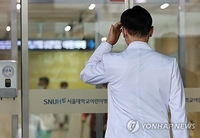 Looming weekly closure of major hospitals feared to worsen medical service crisis
Looming weekly closure of major hospitals feared to worsen medical service crisis















